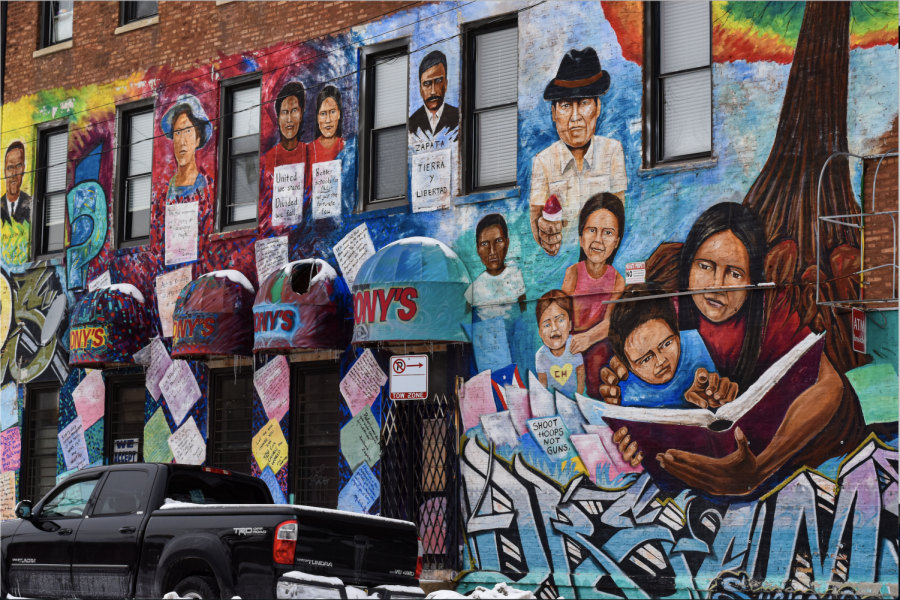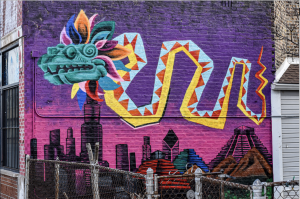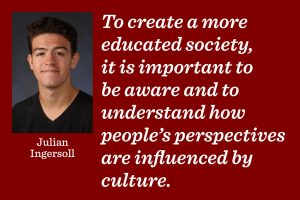Chicago’s Latinx communities face unique challenges combating pandemic
Street art covers the wall of a building in Pilsen, one of Chicago’s primarily LatinX neighborhoods.
February 16, 2021
With citywide COVID-19 positivity rates beginning to fall at last, for many the end of the pandemic seems within reach. However, positivity rates within Chicago’s Latinx communities have remained high at 8.5%, more than two times the citywide positivity rate, according to the City of Chicago COVID-19 dashboard.
Senior Veronica Godina, president of Latinos Unidos, has seen the effects of the high positivity rates on her neighborhood, Brighton Park, on the city’s southwest side.
“Basically, all of our neighbors are essential workers,” Veronica said. “My dad works in the meatpacking industry. The rates of infection at those factories is insane. Most of our neighbors are also factory workers. There’s really no one around that has the luxury of staying at home to do work, because they’re factory jobs, you have to go there.”
As a result of her father’s job, Veronica and her family got COVID-19 earlier this year.
“The way that my dad’s job is handling things, it’s very easy to get infected and there’s not very much space for social distancing,” Veronica said. “I wish we had the luxury of my dad not being able to go to work and he could take some time off. Unfortunately, that’s not possible.”
Referencing the 2020 National Health Interview Survey by the U.S. Census Bureau, Spanish teacher Dinah D’Antoni said that during the pandemic the number of Latinx people reporting feelings of depression was double that of white people. Additionally, the survey found that 40% of Latinx people reported an increase in substance use, in contrast with 15% of other respondents.
Despite this, of the 100,000 people vaccinated in Chicago, over half are white, and just 17% are Latinx according to an article in the Chicago Sun-Times. Veronica believes the city should be vaccinating communities of color even if they don’t fall into the current 1B eligibility group because of how much higher positivity rates are in those communities.
“Culturally, Latinx households tend to be multigenerational,” Veronica said. “Even though not all of them are 65-plus or they’re not all high risk, it’s very important to begin vaccinating them, because, if not, the rates of infection are going to continue to increase because in one household, it’s not four people getting infected, depending on how many people live in your household, it’s like six, eight people.”
However, the task is not simple.
“My parents, they’re immigrants from Mexico, and they’re very skeptical of the vaccine. And it took a lot of explaining it to them because there’s a lot of mistrust in medical stuff,” Veronica said. “A lot of people have had the experience where they’re not taken seriously, especially when they’re Spanish-speaking people and they don’t have anyone they can communicate with.”
Veronica said many people in her neighborhood are undocumented, which adds another layer of mistrust in the vaccination process.
“There’s this distrust of the government knowing your name, basically just being very wary of everything,” Veronica said. “They don’t want to give their information over when trying to get a COVID test. And when they have to fill out the race and stuff like that, the immediate question is: Who’s going to get this information? Why do you want it?”
To remedy this distrust, Dr. D’Antoni said the city should work with community organizations and nonprofits to spread information about the vaccine.
“They explain the benefits and the advantages, and they help them to let them know that it’s OK, that they reach out and they can go — they can get vaccinated,” Ms. D’Antoni said.
The office of Alderman George Cardenas, whose 12th Ward includes Brighton Park, has compiled resources to help educate and mitigate the spread of COVID-19. Other Aldermen have also provided resources for their communities.
According to Veronica, a critical element to the success of the city’s efforts is making information accessible in Spanish.
“The main thing that the city can do to build trust is make the COVID information more accessible to people who don’t speak English at COVID testing centers,” Veronica said. “I know some people don’t want to go because they’re embarrassed about their English skills.”
Reaching out to people at their job is another good option, according to Veronica.
“Another way they could do it is like by having workers of the city go to the jobs, the factories and have representatives speak there, speak to the people,” Veronica said, “so that the workers can have their questions answered is another great way to do it.”
Dr. D’Antoni believes that trust will grow in the vaccine as more Latinx people get vaccinated.
“I think the most important thing is to be equitable across the board and reach out to these communities that are underprivileged,” Dr. D’Antoni said. “People of color, minorities, reach out to them, let them know: Yes, the vaccine is free, yes, it doesn’t matter if you’re documented or undocumented. It doesn’t matter. Reach out and get vaccinated.”






























































